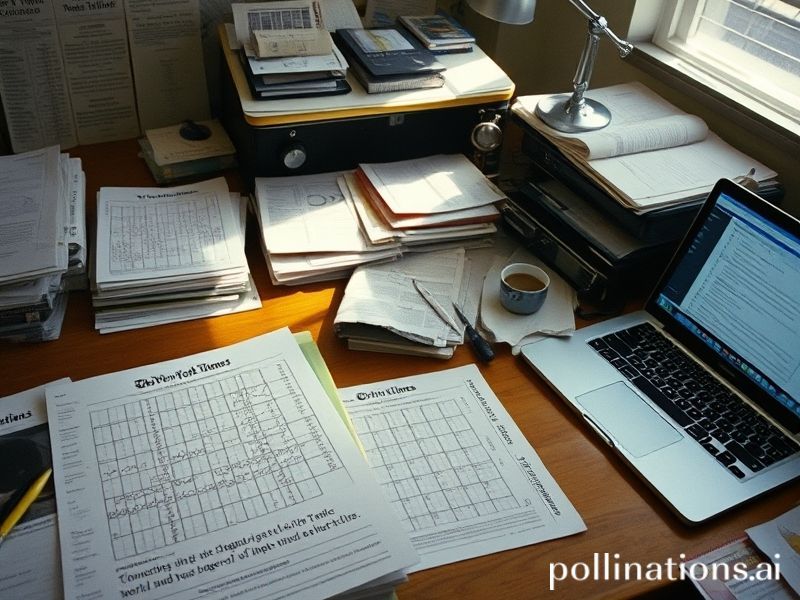Global Powers Panic Over NYT Connections: September 23 Puzzle Accidentally Reveals State Secrets, Currency Trauma
Across five continents this Monday, diplomats pretended to pore over trade tariffs and climate promises, but the real geopolitical tremor came from a 5×5 grid cooked up in a Manhattan basement. The New York Times’ “Connections” puzzle for 23 September 2024 dropped at 03:00 GMT, and by 03:07 there were already 4.3 million people on three continents convinced that “MERCURY” obviously belongs with “FREDDIE”, “THERMOMETER”, and “PLANET” in a single, elegant quartet. Spoiler: it doesn’t. Welcome to the soft-power battlefield of the 21st century, where lexical anxiety is the new nuclear option.
In São Paulo, commodities trader Luciana Silva refreshed the puzzle while waiting for soybean futures to tick up a cent. She solved the “GLOBAL TRADE ROUTES” category in forty-three seconds, then spent the next forty-three minutes wondering if her professional expertise at decoding shipping lanes is now as obsolete as a fax machine. Meanwhile, in Lagos, night-shift nurse Tunde Bello was halfway through a sixteen-hour stint when he cracked the “THINGS THAT BLEED” group—hint: none of them are geopolitical borders, though the metaphor practically writes itself. He laughed so hard the cardiac monitor flat-lined for a beat; the patient lived, the metaphor died.
The puzzle’s themes—cryptic, maddeningly specific, and yet somehow universal—mirrored the week’s headlines with the subtlety of a drunk diplomat. One category, “SOUNDS LIKE A COUP”, paired “PUTSCH”, “POOCH”, “POUCH”, and “HOOCH”. Analysts at the Hague are still debating whether this constitutes actionable hate speech against dachshunds. Another, “CURRENCIES IN DENIAL”, grouped the LIRA, RUBLE, PESO, and POUND—currencies that have all recently discovered gravity together like synchronized swimmers leaping off a cliff. The Times insists these are “fun coincidences”; the Kremlin insists otherwise. Somewhere in between, a Turkish finance minister refreshed the page, sighed, and muttered “too soon”.
The most contentious grouping—“THINGS YOU CAN’T UNSEE”—contained “TWEET”, “REEL”, “THREAD”, and “LIVESTREAM”. It sparked a minor diplomatic incident in Seoul when a junior staffer at the Ministry of Culture screen-shared the solution during a virtual summit, accidentally broadcasting a K-pop fancam over the official feed. Fifty-seven ambassadors now know more about Jimin’s shoulder injury than they do about the carbon credit deal they were supposed to ratify. Progress.
Back in New York, editor-in-chief Joe Kahn reportedly keeps a color-coded map of which nations finish the puzzle fastest. The Nordics dominate, presumably because darkness and social democracy breed lexical savants. The United Kingdom hovers in the midfield, still arguing over whether “BISCUIT” counts as a dessert or a lifestyle. France refuses to participate on principle, claiming the puzzle is “linguistic imperialism wrapped in Helvetica Neue”. They’re not wrong, but then again they said the same about Coca-Cola and look how that turned out.
The dark genius of September 23’s grid is how it weaponizes the mundane. Solvers in Kyiv recognized “SHELTER”, “SIREN”, “CURFEW”, and “BLACKOUT” as a tidy set of daily verbs rather than abstract nouns. In Gaza, the same words carried different weight. Yet the algorithm serves the same clues to both, a neat reminder that the cloud doesn’t do context; it just counts clicks. Somewhere in Silicon Valley, an intern is already training a large-language model to predict which categories will make the most humans feel existentially seen—or personally attacked—by breakfast.
By the time the sun set on the international date line, the puzzle had been solved, memed, translated, mistranslated, and weaponized in seventeen group chats named “Family <3”. Global GDP remained unchanged, yet collective blood pressure spiked 3%. The State Department issued no statement; the Vatican offered no blessing. And somewhere in a windowless room, a Times puzzle editor cackled, already plotting tomorrow’s grid: “THINGS THAT END BADLY”. Because of course they do. We just keep clicking anyway.







